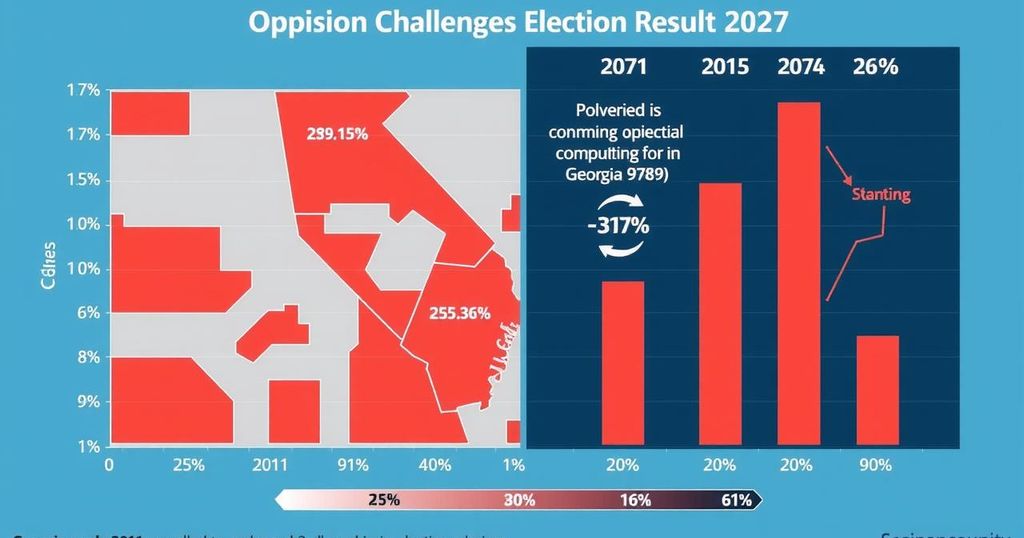Georgia’s Elections Marred by Accusations of Fraud and Violence
Georgian elections on October 26, 2024, were contested amidst allegations of voter fraud and violence, leading to accusations against the ruling party, Georgian Dream (GD). Exit polls contradicted official results, raising concerns about the credibility of the Central Election Commission. Despite GD’s claims of victory, observers called for independent investigations to uphold democratic principles and protect voter rights in the face of rising authoritarianism and electoral violence globally.
On Saturday, October 26, 2024, voters in Georgia participated in crucial elections, the most significant since 2003. The ruling party, Georgian Dream (GD), claimed victory amidst widespread allegations of voter fraud from opposition parties and international observers. Despite these accusations, Prime Minister Iralki Kobakhidze declared a “landslide” win for GD. Exit polls conducted by pro-opposition media indicated a different outcome, showing GD with only 40.9% to 42% of the vote, while the combined opposition garnered between 48% and 51.9%. The Central Election Commission (CEC) reported preliminary results featuring GD with 56% of the votes counted from 99% of districts, raising concerns over the CEC’s impartiality and the integrity of the election process due to reported violence and intimidation at polling stations. The coalition of election observers known as My Vote highlighted that the levels of fraud and violence rendered the CEC’s preliminary findings suspect. Opposition representatives discovered significant inconsistencies between official data and their own findings. Prime Minister Kobakhidze responded to the criticism by acknowledging irregularities yet maintained that the overall elections adhered to democratic principles. Former EU ambassador Eklund countered this viewpoint, emphasizing how voter intimidation substantially compromised the elections.
Amidst a global backdrop of heightened electoral activity where approximately 70 nations held or will hold elections this year, Georgia’s situation reflects ongoing challenges, including violent disruptions and setbacks in democratic processes. Similar instances of electoral turmoil were observed in Venezuela, underscoring a troubling trend of violence impacting elections worldwide. This situation calls attention to the role of election monitoring organizations, which are crucial for safeguarding electoral integrity. It is imperative that any allegations of fraud in Georgia be thoroughly investigated by independent bodies to honor the electorate’s will.
Having been in power for a decade, Georgian Dream’s recent campaign prominently featured themes related to the ongoing war in Ukraine, suggesting that opposition forces would risk national security. This narrative resonated, particularly in light of Georgia’s historical conflict with Russia in 2008. The possibility of EU membership for Georgia encountered setbacks due to GD’s anti-Western tone and the enactment of a law in mid-2024 perceived as threatening democracy, prompting significant protests. GD’s founder, Bidzina Ivanishvili, has expressed intentions to curtail opposition and positions civil society as aligned with Western interests. Consequently, GD’s electoral success may encourage increased alignment with Moscow, expanding Russia’s influence in the region.
The elections in Georgia are set against the backdrop of significant political context. The Georgian Dream party has maintained power for approximately 12 years while facing scrutiny over its democratic practices. The nation has seen considerable tensions related to its geopolitical positioning between Europe and Russia, further complicated by external events such as the war in Ukraine. The environment leading up to the elections was marred by allegations of voter intimidation and mounting evidence of electoral fraud, raising questions about the integrity of the democratic process in Georgia. Observers from various international organizations and pro-democracy coalitions have continuously emphasized the necessity for free and fair elections, which remain critical for the country’s legitimacy and future.
In summary, the recent elections in Georgia have sparked significant controversy and concern over electoral integrity and democratic principles. Allegations of widespread voter fraud and violence have undermined the ruling party’s claimed victory, leading to calls for independent investigations into the electoral process. The situation in Georgia mirrors broader global challenges in upholding democracy, particularly amidst rising authoritarianism and violent electoral practices. As the international community observes these developments, the protection of electoral integrity remains paramount for ensuring that the democratic will of the people is genuinely reflected in their governance.
Original Source: theowp.org




Post Comment